
As we age, our connection to the world around us becomes increasingly important for maintaining both physical and mental well-being. For the elderly, spending time in nature can offer a multitude of benefits that enhance the quality of life, promote health, and foster a sense of peace and belonging. From improved cognitive function to reduced stress levels, the positive impacts of nature on older adults are both diverse and significant.
1. Physical Health Improvements
One of the most immediate benefits of spending time outdoors for the elderly is the improvement in physical health. Natural environments encourage movement and gentle exercise, which are crucial for maintaining mobility and strength in later years. Walking in parks, gardening, or simply sitting in a natural setting can lead to:
- Increased vitamin D levels through sun exposure, supporting bone health and immune function
- Improved cardiovascular health through low-impact activities like walking or tai chi in outdoor spaces
- Enhanced respiratory function from breathing fresh, clean air
- Better sleep patterns due to exposure to natural light, which helps regulate circadian rhythms
For those with limited mobility or recovering from injuries, even short periods in nature can provide significant physical benefits. The uneven terrain of natural settings can also help improve balance and coordination, reducing the risk of falls—a major concern for many older adults.
2. Cognitive Function and Mental Health
The impact of nature on cognitive function and mental health in the elderly is profound. Research has shown that regular exposure to natural environments can:
- Reduce the risk of cognitive decline and dementia
- Improve memory and attention span
- Enhance creative thinking and problem-solving skills
- Alleviate symptoms of depression and anxiety
For individuals living with conditions such as Alzheimer's or other forms of dementia, nature-based therapies have shown promising results in improving mood and reducing agitation. The sensory stimulation provided by natural settings—the sounds of birds, the feel of a breeze, the scent of flowers—can evoke positive memories and emotions, providing comfort and a sense of connection to the world.
3. Stress Reduction and Emotional Well-Being
The calming effect of nature on the human psyche is well-documented, and for the elderly, this can be particularly beneficial. Spending time in green spaces has been shown to:
- Lower cortisol levels, the body's primary stress hormone
- Reduce blood pressure and heart rate
- Improve overall mood and emotional state
- Increase feelings of happiness and life satisfaction
For older adults dealing with the challenges of aging, such as loss of independence or health issues, nature can provide a much-needed respite and a sense of peace. The simple act of observing natural beauty can instill a sense of wonder and perspective that helps put daily worries into context.
4. Social Connection and Community Engagement
Nature provides an excellent backdrop for social interaction, which is crucial for combating loneliness and isolation in the elderly. Outdoor activities can foster:
- Opportunities for intergenerational bonding, such as grandparents taking grandchildren to parks
- Group activities like nature walks, bird watching, or outdoor yoga classes
- Volunteer opportunities in community gardens or conservation projects
- Casual social encounters with neighbors and community members in shared green spaces
These social connections not only improve emotional well-being but also contribute to a sense of purpose and community involvement, which are vital for healthy aging.
5. Sensory Stimulation and Cognitive Engagement
Natural environments offer rich sensory experiences that can be particularly beneficial for older adults, including those with cognitive impairments. The variety of sights, sounds, smells, and textures in nature can:
- Stimulate the senses and promote mindfulness
- Encourage curiosity and lifelong learning
- Provide opportunities for reminiscence and storytelling
- Offer a form of gentle cognitive stimulation that can help maintain mental acuity
For individuals with Neurological Disability, such as Parkinson's disease or stroke-related impairments, exposure to nature can offer therapeutic benefits. The natural environment provides a non-threatening space for physical therapy exercises, sensory stimulation, and cognitive engagement, which can complement traditional medical treatments and potentially improve outcomes.
6. Environmental Awareness and Stewardship
Engaging with nature can foster a sense of environmental stewardship in older adults, providing a meaningful way to contribute to the world around them. This can involve:
- Participating in local conservation efforts
- Sharing knowledge about local flora and fauna with younger generations
- Developing a deeper appreciation for the natural world and its preservation
This connection to the environment can give older adults a sense of legacy and purpose, knowing that their efforts contribute to the well-being of future generations.
7. Adaptability and Resilience
Regular exposure to nature can help the elderly develop greater adaptability and resilience in the face of life's challenges. The changing seasons, weather patterns, and cycles of growth and decay in nature serve as metaphors for life's transitions, helping older adults to:
- Accept and adapt to changes in their own lives
- Develop a more philosophical outlook on aging and mortality
- Find comfort in the continuity and renewal of the natural world
Conclusion
The benefits of spending time in nature for the elderly are vast and varied, touching on almost every aspect of health and well-being. From physical improvements and cognitive benefits to emotional well-being and social connections, nature provides a holistic approach to healthy aging. For caregivers, healthcare providers, and community planners, recognizing the importance of natural spaces and facilitating access to them for older adults should be a priority.
As our population ages, integrating nature into elder care strategies—whether through green spaces in residential facilities, nature-based therapies, or community programs that encourage outdoor engagement—can significantly enhance the quality of life for older adults. By fostering a connection with the natural world, we can help ensure that our elderly population not only lives longer but also experiences richer, more fulfilling later years.
© 2025 NatureWorldNews.com All rights reserved. Do not reproduce without permission.





